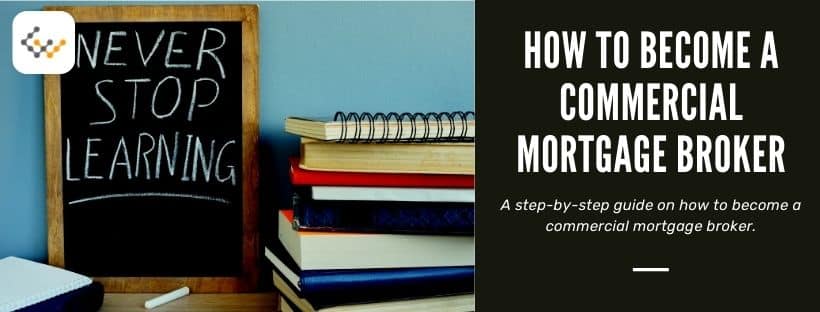How to Become a Commercial Mortgage Broker

Commercial mortgage brokers hold a central role in commercial real estate, as almost every deal goes through them during the financing process. Brokers must understand investors’ and property owners’ needs, the lenders and financing programs available, and how to match the right borrower with the right lender.
If you have financial acumen and are interested in commercial real estate, this can be a promising way to enter the industry. Here’s a step-by-step guide on how to become a commercial mortgage broker.
Answer a few questions and get custom mortgage quotes. We'll match you with offers from our network of 650+ lenders.
What Does a Commercial Mortgage Broker Do?
A commercial mortgage broker acts as an intermediary between commercial property owners (or buyers), and the financial institutions that provide commercial real estate financing solutions.
Unlike residential brokers, commercial mortgage brokers deal with a range of properties such as office buildings, retail spaces, restaurant buildings, industrial complexes, warehouses, event venues, special-use properties (e.g. schools, hospitals), undeveloped land and much more. Almost any property that’s not small residential is something a commercial broker might assist with.
They generally don’t double as a residential mortgage broker who does single-family house mortgages unless they are working at a particularly small bank or credit union. Commercial brokers do regularly help investors and buyers find mortgages for multi-family real estate.
When working with commercial real estate buyers, the responsibilities of a broker include assessing the client’s financial health, understanding their property needs, sourcing suitable mortgage products, negotiating terms, and generally guiding the client through the loan application process.
The job of a commercial loan broker is to pair lenders and investors who may not have access to a traditional loan for their purchase. These brokers learn the intricate and unique details of the investor or business and then locate a lender that can meet those financial requirements the best. Connecting lenders with suitable financial products allows the broker to earn a commission from the close of the transaction.
The intricate knowledge of the commercial real estate industry makes the job of a broker valuable to investors and lenders alike. They help to ensure the borrower’s financial goals are met while still pairing them with an available lender interested in providing a loan, even with sometimes more challenging risks.
Answer a few questions and get custom mortgage quotes. We'll match you with offers from our network of 650+ lenders.
Best Commercial Loan Broker Training Courses
The investment in commercial loan broker training courses should be done to meet any state requirements and to obtain the most up-to-date and industry-specific education possible to work in this field. The following are some of the most respected commercial loan broker training courses available for consideration.
ICS Loans Commercial Mortgage Broker Training
The commercial mortgage broker training program from ICSLoans incorporates the entire process from originating to structuring and closing on these real estate loads. The online program allows students to gain access to the ICS Commercial Funding Platform, which provides hands-on, highly effective training. It incorporates:
- Marketing and lead generation
- Origination, structuring, and packaging of commercial loans
- Sourcing commercial and investment property loans
Commercial Loan Broker Institute
The Loan Broker Launch Program from the Commercial Loan Broker Institute is an exceptional learning platform designed specifically for entrepreneurs who wish to rapidly move into this field. There are several path options to consider ranging from The Basic program to get started to The Start Up, The Executive, and The Elite, each providing a higher tier of education. These programs range but offer training in areas such as:
- Lender network development
- Marketing online and offline
- Broker toolbox
- Skills Bootcamp
Mortgage Training Center
The Mortgage Training Center offers a commercial mortgage broker educational program designed to support individuals in the industry in assisting investors in obtaining several types of loans, navigating the legal aspects of commercial brokerage services, and meeting all compliance requirements. The program offers several paths for students to consider through training courses focused on:
- Commercial processing and underwriting
- Underwriter book camp
- Certified mortgage underwriter
Commercial Capital Training
Another option for those seeking commercial loan broker training, the Commercial Capital Training Group offers a 70-day training program designed to provide individuals with the information and hands-on support they need to begin flourishing in this industry. The program enables individuals to own and operate their own company within a short amount of time. Core components of this educational training program include three package options designed to provide various levels of training and support. Key topics included are:
- Marketing solutions that include an optimized website
- Comprehensive training services
- Broker funding platform training
Funder Intel
Funder Intel provides the education that an entrepreneur needs to work in the industry by owning their own company. This type of program, designed for those who do not want to obtain a license and who may not have any experience, allows students to gain access to the organization’s network for a turnkey finished product – a ready-to-go level of education. Among the numerous topics discussed in this program are:
- How to establish a broker business
- How to choose which commercial loan products to offer
- Finding and packaging deals
Each of these programs is a bit different in what they offer, but that is also what makes them all worth careful consideration. Depending on the applicant’s goals and time to spend learning to become a commercial broker, it is possible to find a program that fits just about any need.
Why You Should Become a Commercial Loan Broker
Pursuing a career as a commercial loan broker offers several advantages.
Firstly, the financial rewards can be substantial, with brokers earning a commission based on the size of the deals they close. This is often the primary motivation for breaking into this type of loan brokering.
Residential mortgage brokers also earn commissions on the loans they match, but the earnings opportunities are much more in commercial real estate because sale prices can be much higher. While home prices may be a few hundred thousand, or a million in expensive cases, commercial real state deals are regularly in the high-six, seven or even eight-figure range.
Second, commercial real estate is most often taken care of during business hours. While residential mortgage brokers don’t work as many nights and weekends as residential real estate agents do, residential brokers are more frequently on call or working evenings and weekends. Commercial real estate allows for more reliable work hours, typically during business hours.
Third, commercial loan brokers have many opportunities throughout their careers. As your career advances, you can become more specialized, work on larger deals, and seek other opportunities within the field. There are constantly chances to seek out bigger financing deals that you might broker.
Fourth, this line of work comes with a fair bit of flexibility. Brokers might work for a brokerage firm or bank, or they might operate independently.
How to Become a Commercial Mortgage Broker
Becoming a commercial mortgage broker is a multi-step process, but it’s one that’s navigable.
- Educational Background: A bachelor’s degree is normally the minimum educational requirement for commercial mortgage brokers. It should be in a finance-related field (e.g. finance, economics, business, etc.). A master’s in one of these fields might be necessary if your bachelor’s isn’t a relevant major, and a master’s degree could help set you apart.
- Licensing Requirements: While not a universal requirement, many states have licensing requirements. You’ll have to meet the requirements of whatever state you intend to practice in. This normally requires taking an exam.
- Most licenses require completing a National Mortgage Licensure System (NMLS) class, and this may be good to take regardless of any state licensing requirements.
- Gain Experience: While you’re able to work as a commercial mortgage broker directly after graduating and getting licensed (if applicable), most employers and clients want someone with experience in the real estate industry. Starting out as a residential mortgage broker is one of the best ways to begin, but you also might consider being a commercial real estate agent. You’ll have an easier time getting established in commercial financing once you have some relevant industry experience.
- Specialized Training: You can further establish yourself by completing additional coursework that’s specific to commercial real estate financing.
- Networking: Networking is necessary in order to succeed as a commercial broker, as you need connections to drive you clients. Networking can also help you land your first job in this field.
- Join a Brokerage Firm: Initially, working with an established firm can provide the necessary exposure, resources, and credibility in the industry. Plan on taking a job, even if you eventually want to run your own commercial real estate brokerage firm.
How to Choose the Best Commercial Mortgage Broker Training
Getting an education to work as a commercial mortgage broker is invaluable. The quality of education received ultimately determines the skills and abilities a person may have within this market. Not all programs are the same, and many are rather lacking. When choosing the best commercial mortgage broker training program, there may be a few key things to look for in that education.
- What does the training include? The best courses are comprehensive, covering a range of topics. Look at the curriculum of any program before making a decision. Which is the most versatile and complete?
- Is marketing included? While there are numerous laws and regulations necessary to learn in this industry, it is also important to understand the marketing aspects of being a broker. Look for a program that incorporates both localized and social media marketing strategies.
- Does it offer mentorship? Some of the most successful programs incorporate mentoring and coaching, allowing students to learn a robust level of hands-on training and to have a professional available to speak with when they need support.
In addition to these factors, today’s education and training typically offer hands-on support as well as ongoing educational opportunities. The best companies help new brokers to become established locally so they can work to achieve their goals and meet industry compliance and regulation requirements.
Do Commercial Loan Brokers Need a License?
The requirement to maintain a commercial loan broker’s license is dependent on the state in which the broker works. Most states do not require a commercial broker license. Each individual should investigate the requirements within their state based on the state licensing board’s data. Even when licensing is not required, it can be a valuable tool to help prepare individuals to work in this area.
What Skills Do You Need to Become a Commercial Loan Broker?
Certain aptitudes and soft skills will help you succeed as a commercial loan broker.
- Financial Acumen: You’ll need to understand and explain commercial mortgage agreements, which can be more complex than residential ones.
- Analytical Skills: You’ll have to analyze clients’ financial positions and property valuations, as well as determine what mortgage program best meets a client’s needs.
- Communication and Interpersonal Skills: Strong interpersonal skills are essential for networking and connecting with clients. Communication skills are also very much needed when negotiating contracts.
- Problem-Solving Abilities: Challenges arise during commercial real estate deals, and many issues can impact financing. You’ll have to find creative financing solutions in some cases, whether that’s non-standard financing itself or getting traditional financing even when an issue arises.
- Attention to Detail: Reviewing and assessing legal documents and financial agreements is extremely detail-oriented.
- Salesmanship and Marketing: Sales skills are helpful when securing clients, and also when presenting them with financing options.
Wrapping Things Up
Pursuing a career as a commercial mortgage broker requires a blend of education, licensing, experience and soft skills. This can be a very rewarding career if you’re well-suited for it, though. The daily work can be challenging, interesting and quite financially rewarding.
Learn more about CommLoan’s Loan Originator program

